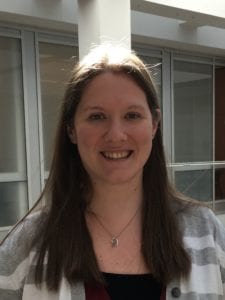
Trainee Author: Cassandra N. Spracklen, PhD
Postdoctoral Fellow
University of North Carolina at Chapel Hill
(Photo courtesy Spracklen)
This study provides novel insights into the population genetics of blood lipid levels – important contributors to cardiovascular risk across the globe. By conducting a trans-ancestry meta-GWAS of East Asian and European individuals, the authors pinpoint new potential lipid loci.
The study provides a valuable contribution to the still mostly European ancestry-focused large-scale genetics of complex traits. It provides an example of how collaborative research across continents and ethnicities can bring us closer to our ambition of making genomic medicine applicable to everyone – regardless of ethnic origin and place of birth.
ASHG: Could you describe your research for us?
Dr. Spracklen: GWAS have been an efficient tool for identifying genetic loci associated with cardiometabolic traits. However, for most of the loci identified to date, the gene underlying the association signal, the direction of effect, and the mechanism(s) by which the variant result in the observed trait or disease remain largely unknown. My current research combines fine-mapping and bioinformatic methods together to predict functional regulatory variants at GWAS loci. I then help design and guide experiments that test my predicted variants for differences in transcriptional activity.
ASHG: What are your career goals?
Dr. Spracklen: My long-term career and research goal is to establish an independent research program as a principal investigator examining the mechanisms by which DNA variants affect genes and biological pathways that lead to adverse trait levels and disease.
ASHG: Why did you choose genetics as your field of study?
Dr. Spracklen: Since learning about genetics in high school, I have always been in awe of how one little swap in a DNA variant could have such dramatic phenotypic results. In undergrad and grad school, I became very interested in trying to pinpoint exactly which variants are responsible for influencing disease risk, which I now focus on as a postdoc.
ASHG: Describe yourself in three words.
Dr. Spracklen: Detail-oriented, Independent, and Motivated.
The Trainee Paper Spotlight highlights outstanding papers written by trainee members of ASHG. Submit your science to be featured, and join the ASHG Trainee Forum to keep up with new ones.
